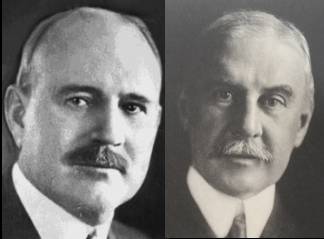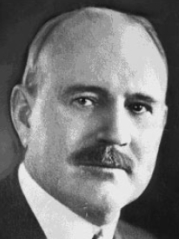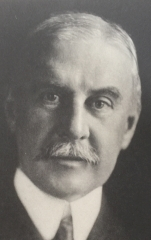 Every story has good guys and bad guys. It’s obvious Billy Durant is the hero, so who were the villains standing in his way?
Every story has good guys and bad guys. It’s obvious Billy Durant is the hero, so who were the villains standing in his way?
Apart from the entire Wall Street establishment who resented the amiable upstart from Michigan who kept showing them up, two individuals stand out. One was a close friend who betrayed him and the other an outsider who did his utmost to permanently banish Billy while feasting on his baby.
Charles Nash
 Charlie Nash grew up dirt poor. His parents split when he was six and he was put out as an indentured worker. He couldn’t go to school and learned what he could on his own between all the jobs he could scrounge up to make ends meet.
Charlie Nash grew up dirt poor. His parents split when he was six and he was put out as an indentured worker. He couldn’t go to school and learned what he could on his own between all the jobs he could scrounge up to make ends meet.
When Billy Durant and Dallas Dort began their buggy business someone else made the carts for them. Greed prompted that outfit to steal their design, forcing the young duo to start their own manufacturing operation.
Charlie Nash became their first employee at a dollar a day. From the get-go he distinguished himself with his attention to detail, orderliness and plain hard work. Coworkers resented his hard work. “You make us look bad.” But he needed the money more than approval. It wasn’t long before his knack for increasing efficiency led to promotion to production supervisor and general manager of the horse-drawn vehicle operation.
When Billy made the transition to automobiles Nash soon moved over and became Buick’s production manager. As GM grew Nash earned the top job at Buick.
Billy’s main contribution to the phenomenal success of their vehicle operations was his salesmanship. He lived in hotels as the traveled the country, while Dort remained the steady hand anchoring the home front. Nash became his trusted sidekick and a surrogate son.
Nash understood the need for growth but he was never a fan of the constant disruption it brought. They had to build an entire new factory every single year to keep pace with Billy’s growing list of models. Nash likened it to a chicken running from an oncoming express train. He wanted to introduce order and organization but the avalanche of orders from Billy’s growing network of independent dealers kept him behind.
When Billy’s hectic expansion of General Motors brought it to its knees Nash was more relieved than surprised. Because it brought him in contact with his new BFF:
James Jackson Storrow
 Central casting could not have brought the plot a character more different from Billy than Mr. Storrow. A conservative Boston Brahmin banker, educated at Harvard and a devotee of discipline, he loved order and the ways of Wall Street.
Central casting could not have brought the plot a character more different from Billy than Mr. Storrow. A conservative Boston Brahmin banker, educated at Harvard and a devotee of discipline, he loved order and the ways of Wall Street.
Lee, Higginson (or Lee Hig as it was commonly known) was considered a solid member of the Wall Street banking fraternity, despite being based in Boston.
In the 1800s the most common investment was bonds, not stocks. (Well, that’s still true, despite the stock market hogging the spotlight, but that’s another blog. 🙂 ) The most common bonds were issued by governments, and that is what Lee Hig specialized in.
Storrow brought two innovations. First, he added a sales force which literally peddled bond investments door to door. Second, he added bonds issued by private businesses. The late 1800s saw America in the midst of an unprecedented industrial revolution, with entire industries springing up like mushrooms in a long, dark night. To sell his industrial bonds, Storrow made sure they were only of the highest quality.
In 1910 he ran for mayor of Boston. No election before or since generated a higher turnout (more than 80%) or a closer finish. Small consolation that was for our Mr. Storrow, though. He lost.
He vowed to find a project with enough substance to remove the sting of his defeat. As if it was ordered, General Motors appeared on his doorstep and he grasped it like a drowning man a life bouy.
Teaming Up
Storrow was horrified at what he saw. To his orderly banker’s mind General Motors was mess. One person caught his eye, however: the orderly and disciplined Charles Nash. He isolated Billy from every aspect of the company and made Nash president of General Motors.
Together, they set about cleaning up the chaos and disorder from Billy’s rapid growth. That came at the expense, however, of surrendering market share. When they took over, GM had 20% of the automobile market, but by the time Billy began his comeback, that had slipped to 8%.
Storrow didn’t care. His only concern was generating cash to make sure the bonds were repaid on schedule. GM was a passing project, but his clients would remain with him forever, so he put their interests above those of the company. Nash, a lover of order and efficiency, agreed.
Billy was appalled at Nash’s betrayal. He had given Nash every break, was the first person to treat him decently and reward him for his contributions. To see his protege turn his back on him stung.
Billy was famous for never showing emotion and staying positive. (Good for him but a challenge for a novel writer, by the way.) So he could accept Storrow’s hostility. After all, he was an outsider from another part of the world. What turned a shrug of the shoulders to red-hot anger, though, was Nash’s complicity with Storrow’s systematic campaign of urbane pillaging.
What I like about Xanax is that it is available in several medical forms. I prefer extended-release Xanax tablets as they can be taken once daily. The dose I use is the lowest one – 1 mg daily. In the first few days of the therapy, I felt a bit sleepy during the day. Yet this side effect resolved on its own after a while.
Storrow had promised to return GM to Billy once the five year note was paid off in 1915. By 1913 Billy began to suspect Storrow planned to renege on his word. Furthermore, although GM had more than enough cash to repay the bonds, Storrow kept lending money to the company, simply to take in risk-free interest income. Nash refused to take a stand for integrity, his nose firmly affixed to his new friend’s posterior.
Thus Storrow and Nash squatted on the company Billy created–two smart and capable men, with the vast resources of Wall Street on their side. And no scruples. How could Billy beat that combination? Comeback! spills the details.